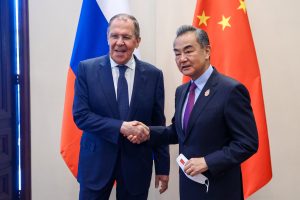The G-20 Foreign Ministers’ Meeting in Bali, Indonesia, marked the first time Russia’s Foreign Minister Sergey Lavrov was in the same room as his counterparts from the G-7 nations since Russian troops invaded Ukraine in February 2022. Things did not go particularly well — Lavrov walked out of the G-20 meeting altogether on Friday, complaining that Western governments were only interested in “frenzied” criticism of Russia.
But he found a more friendly reception in his bilateral meeting with Chinese Foreign Minister Wang Yi.
Wang was the first foreign minister to shake hands with Lavrov after the Russia-Ukraine War began, welcoming his Russian counterpart to a China-hosted conference on Afghanistan in March. It was a clear signal that Beijing has no intention of altering course on its “no limits” partnership with Moscow, despite the invasion of Ukraine and Russia’s resulting pariah status in the West.
Wang met again with Lavrov on July 7 in Bali. According to a Chinese Foreign Ministry readout, he pointedly noted that China and Russia had “eliminated interference” and “maintained normal exchanges” despite an unstable global situation. Wang didn’t specify what this “interference” was, but the implication is that Beijing is proud of its commitment to uphold ties with Moscow, despite pressure from the West.
Lavrov made a similar comment, saying that “Russia-China relations are not subject to external interference.” He also mentioned that Russia will support China’s Global Development Initiative and Global Security Initiative, another sign that Moscow and Beijing are still committed to working together to overturn the status quo in the international order (a process that both governments call “democratizing” international relations). That was a major theme of the joint statement issued by Xi Jinping and Vladimir Putin in early February 2022, and the invasion of Ukraine has not changed Beijing’s calculus.
To that end, Wang said that “opposing hegemony and bullying and resisting unilateralism are the common aspirations of the vast majority of development countries.” He framed the world as facing a choice: “To truly maintain the international order with the United Nations as the core, or to uphold the rules drawn up by a few countries based on their own standards?”
“I believe that, as time passes, more and more countries will see this more clearly and make the correct choice,” Wang added.
Ukraine only received a brief mention in the Chinese readout, which said Lavrov had discussed the current situation and Russia’s position. Wang assured that China would “continue to uphold an objective and fair position” and “focus on promoting peace talks.”
Interestingly, the more important statement of China’s position on Ukraine came not in the Lavrov-Wang talks, but in Wang’s meeting with India’s external affairs minister. During that meeting, Wang expounded on China’s “three concerns over the situation in Ukraine,” which China’s Foreign Ministry released as a separate readout.
First, Wang said, “China opposes exploiting the situation to incite Cold War mentality, hype up bloc confrontation, and create a ‘new Cold War.’”
Second, Wang denounced “double standards” on sovereignty and territorial integrity. He accused unnamed countries of upholding Ukraine’s sovereignty but refusing to recognize Beijing’s claim to rule Taiwan. “The Chinese side rejects any attempt to draw parallels between the Ukraine crisis and the Taiwan question, and will firmly defend its core interests,” Wang declared.
Third and finally, Wang said that “China opposes harming another country’s legitimate rights to development.” In practice, this boils down to an opposition to unilateral sanctions, which Wang said are “neither justified nor legal.”
“Such moves have undermined normal state-to-state exchanges, violated the prevailing rules of international trade, and also complicated and magnified the Ukraine crisis,” he continued.
Notably, China’s “concerns” about the “situation in Ukraine” do not include any mention of the humanitarian crisis unfolding on the ground, or the massive destruction being caused to Ukraine by the Russian invasion.
Both the message and the setting are crucial here. By issuing this statement in a meeting with India’s external affairs minister, it’s clear China hopes to find common ground on this point with India and other developing countries that have been hard hit by the economic turmoil resulting from the Russian invasion of Ukraine, as well as the economic sanctions applied on Russia. China’s narrative to the developing world is, essentially, that the West is attempting to force them to join sides in a “bloc confrontation,” which runs counter to individual states’ own “legitimate rights to development.”
Governments in the U.S. and Europe that wish to counter this messaging must first be aware of how much potential there is for it to resonate. For countries struggling to secure enough grain or oil to meet their population’s needs, grand statements about international norms and principles are unlikely to be as persuasive as leaders in the West might think. One has only to look at a map of the countries that abstained from U.N. resolutions condemning Russia for the invasion to see this pattern in action.
U.S. Secretary of State Antony Blinken was hard at work countering China and Russia’s messaging that Western sanctions are to blame for the world’s economic troubles. Instead, Blinken has been hammering home the point that “Russia’s aggression against Ukraine is worsening food insecurity.”
Wang is also scheduled to meet with Blinken in Bali, to discuss China-U.S. relations and important global and regional issues – including Ukraine. It will be their first in-person meeting since October 2021, making it also their first face-to-face conversation since Russia invaded Ukraine.
In a pre-trip briefing, U.S. Assistant Secretary for East Asian and Pacific Affairs Dan Kritenbrink told reporters that the meeting “will be another opportunity, I think, to have a candid exchange on that and to convey our expectations about what we would expect China to do and not to do in the context of Ukraine.”

































